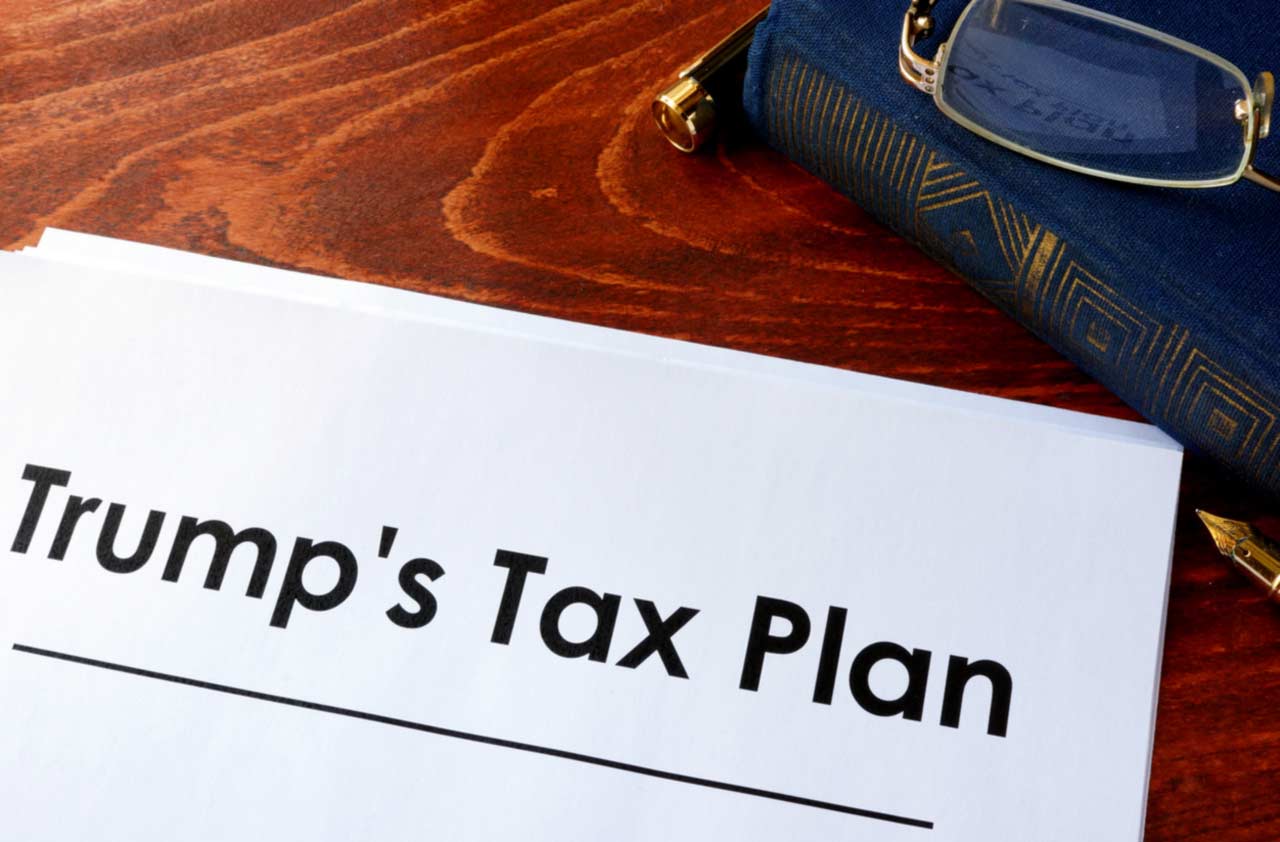The Trump Tax Plan: Where’s the Beef?
The lack of details in President Trump’s just-announced tax plan raises more questions than answers, but one thing's evident: The proposal shows the hallmarks of “trickle-down economics.”


Profit and prosper with the best of Kiplinger's advice on investing, taxes, retirement, personal finance and much more. Delivered daily. Enter your email in the box and click Sign Me Up.
You are now subscribed
Your newsletter sign-up was successful
Want to add more newsletters?

Delivered daily
Kiplinger Today
Profit and prosper with the best of Kiplinger's advice on investing, taxes, retirement, personal finance and much more delivered daily. Smart money moves start here.

Sent five days a week
Kiplinger A Step Ahead
Get practical help to make better financial decisions in your everyday life, from spending to savings on top deals.

Delivered daily
Kiplinger Closing Bell
Get today's biggest financial and investing headlines delivered to your inbox every day the U.S. stock market is open.

Sent twice a week
Kiplinger Adviser Intel
Financial pros across the country share best practices and fresh tactics to preserve and grow your wealth.

Delivered weekly
Kiplinger Tax Tips
Trim your federal and state tax bills with practical tax-planning and tax-cutting strategies.

Sent twice a week
Kiplinger Retirement Tips
Your twice-a-week guide to planning and enjoying a financially secure and richly rewarding retirement

Sent bimonthly.
Kiplinger Adviser Angle
Insights for advisers, wealth managers and other financial professionals.

Sent twice a week
Kiplinger Investing Weekly
Your twice-a-week roundup of promising stocks, funds, companies and industries you should consider, ones you should avoid, and why.

Sent weekly for six weeks
Kiplinger Invest for Retirement
Your step-by-step six-part series on how to invest for retirement, from devising a successful strategy to exactly which investments to choose.
On Wednesday, April 26, President Trump released his long-awaited tax proposal … well, sort of. The one-page outline provided by the White House should not be viewed as a plan, rather we should see it as a beginning of negotiations (after all Mr. Trump has a self-proclaimed love for negotiations).
Here is some of what we know so far:
- The plan would call for a reduction in tax brackets from the current seven to three: 10%, 25% and 30%.
- It would eliminate most line-item deductions — including those for state and local taxes, sales taxes, gambling losses and moving expense — with the noted exceptions of the mortgage interest deduction and charitable gift deduction.
- It would significantly raise the standard deduction, which Americans can use to reduce their taxable incomes.
- And on a corporate level, President Trump is following through on his campaign pledge to greatly reduce corporate taxes – from 35% down to 15% — as well as offering a “one-time” opportunity for corporations to repatriate offshore cash to the United States at a 10% tax rate.
What is glaringly missing from this outline are the revenue offsets, i.e. how we would pay for all of this. Unless the plan includes specific revenue-generating items, one has to assume that this “plan” is, in essence, one giant turbo-charged trickle-down economics plan (a long favorite economic theory among Republicans).
From just $107.88 $24.99 for Kiplinger Personal Finance
Become a smarter, better informed investor. Subscribe from just $107.88 $24.99, plus get up to 4 Special Issues

Sign up for Kiplinger’s Free Newsletters
Profit and prosper with the best of expert advice on investing, taxes, retirement, personal finance and more - straight to your e-mail.
Profit and prosper with the best of expert advice - straight to your e-mail.
On the personal income tax front, it is hard to argue with the need for a simpler more straightforward tax code (although I suspect the good folks at H&R Block (ticker: HRB) and Jackson Hewitt will protest loudly). Eliminating or significantly restructuring the convoluted line-item deduction mechanism and alternative minimum tax is more than needed. And in theory, the end result could be a “wash” for many as line-item deductions are eliminated in favor of a lower tax bracket. The devil will be in the details, and there aren’t any of these yet (on Thursday morning White House Budget Chief Mick Mulvaney said the vagueness of the proposal is intentional).
On the corporate side, the issues and shortsightedness are much clearer, and have a historical track record. In 2004 Congress, at the urging of then President George W. Bush, passed the repatriation tax holiday, which brought back some $312 billion into the United States. Predictably, very little of this money was utilized to create jobs, as investment or capital expenditure. Rather, it was used for share buybacks, increased and one-time dividends and generally for the benefit of shareholders.
President Trump’s proposal seems to follow a similar path and it offers flawed expectations that this time around corporations will act in the country’s best interest, as opposed to their own and their shareholders’.
Perhaps if President Trump attaches certain investment mandates or penalties for misappropriating the funds the plan could be very beneficial to our economy. But as it stands now, the premise of trickle-down economics is unlikely to have results that differ from previous engagements of this policy.
It’s impossible to give President Trump a “grade” on his tax proposal, as it isn’t much of a proposal at all yet. However, from a market and investor perspective, it is one more piece of “hope and good news” that could help keep this bull market alive and drive stocks materially higher.
Profit and prosper with the best of Kiplinger's advice on investing, taxes, retirement, personal finance and much more. Delivered daily. Enter your email in the box and click Sign Me Up.

Oliver Pursche is the Chief Market Strategist for Bruderman Asset Management, an SEC-registered investment advisory firm with over $1 billion in assets under management and an additional $400 million under advisement through its affiliated broker dealer, Bruderman Brothers, LLC. Pursche is a recognized authority on global affairs and investment policy, as well as a regular contributor on CNBC, Bloomberg and Fox Business. Additionally, he is a monthly contributing columnist for Forbes and Kiplinger.com, a member of the Harvard Business Review Advisory Council and a monthly participant of the NY Federal Reserve Bank Business Leaders Survey, and the author of "Immigrants: The Economic Force at our Door."
-
 Nasdaq Leads a Rocky Risk-On Rally: Stock Market Today
Nasdaq Leads a Rocky Risk-On Rally: Stock Market TodayAnother worrying bout of late-session weakness couldn't take down the main equity indexes on Wednesday.
-
 Quiz: Do You Know How to Avoid the "Medigap Trap?"
Quiz: Do You Know How to Avoid the "Medigap Trap?"Quiz Test your basic knowledge of the "Medigap Trap" in our quick quiz.
-
 5 Top Tax-Efficient Mutual Funds for Smarter Investing
5 Top Tax-Efficient Mutual Funds for Smarter InvestingMutual funds are many things, but "tax-friendly" usually isn't one of them. These are the exceptions.
-
 Social Security Break-Even Math Is Helpful, But Don't Let It Dictate When You'll File
Social Security Break-Even Math Is Helpful, But Don't Let It Dictate When You'll FileYour Social Security break-even age tells you how long you'd need to live for delaying to pay off, but shouldn't be the sole basis for deciding when to claim.
-
 I'm an Opportunity Zone Pro: This Is How to Deliver Roth-Like Tax-Free Growth (Without Contribution Limits)
I'm an Opportunity Zone Pro: This Is How to Deliver Roth-Like Tax-Free Growth (Without Contribution Limits)Investors who combine Roth IRAs, the gold standard of tax-free savings, with qualified opportunity funds could enjoy decades of tax-free growth.
-
 One of the Most Powerful Wealth-Building Moves a Woman Can Make: A Midcareer Pivot
One of the Most Powerful Wealth-Building Moves a Woman Can Make: A Midcareer PivotIf it feels like you can't sustain what you're doing for the next 20 years, it's time for an honest look at what's draining you and what energizes you.
-
 I'm a Wealth Adviser Obsessed With Mahjong: Here Are 8 Ways It Can Teach Us How to Manage Our Money
I'm a Wealth Adviser Obsessed With Mahjong: Here Are 8 Ways It Can Teach Us How to Manage Our MoneyThis increasingly popular Chinese game can teach us not only how to help manage our money but also how important it is to connect with other people.
-
 Looking for a Financial Book That Won't Put Your Young Adult to Sleep? This One Makes 'Cents'
Looking for a Financial Book That Won't Put Your Young Adult to Sleep? This One Makes 'Cents'"Wealth Your Way" by Cosmo DeStefano offers a highly accessible guide for young adults and their parents on building wealth through simple, consistent habits.
-
 Global Uncertainty Has Investors Running Scared: This Is How Advisers Can Reassure Them
Global Uncertainty Has Investors Running Scared: This Is How Advisers Can Reassure ThemHow can advisers reassure clients nervous about their plans in an increasingly complex and rapidly changing world? This conversational framework provides the key.
-
 I'm a Real Estate Investing Pro: This Is How to Use 1031 Exchanges to Scale Up Your Real Estate Empire
I'm a Real Estate Investing Pro: This Is How to Use 1031 Exchanges to Scale Up Your Real Estate EmpireSmall rental properties can be excellent investments, but you can use 1031 exchanges to transition to commercial real estate for bigger wealth-building.
-
 Should You Jump on the Roth Conversion Bandwagon? A Financial Adviser Weighs In
Should You Jump on the Roth Conversion Bandwagon? A Financial Adviser Weighs InRoth conversions are all the rage, but what works well for one household can cause financial strain for another. This is what you should consider before moving ahead.